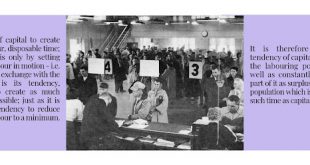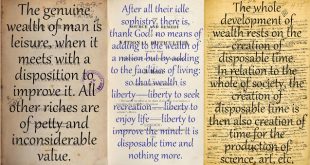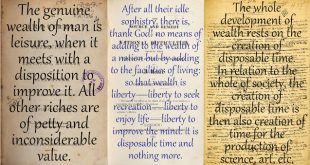Usually, a question in the title of an article is a teaser and the answer is almost always "no." Not in this case. The standard argument is that economic growth is necessary to create jobs and that unemployment results from the slowing or interruption of growth.Even advocates of degrowth or a steady-state economy assume a positive connection between growth and employment. Advocates prescribe reduction of working time as a means to mitigate job losses that would otherwise result from...
Read More »No Covid-19d-19 Here Or in North Korea: Turkmenistan
Yes, Turkmenistan is among the few nations on the planet claiming to have not had a single case of Covid-19, along with the DPRK, aka "North Korea." The October 16 Economist reports, after noting the arrest of Nurgeldi Halykov, who reported that the British ambassador got it, who was, of course, arrested:"Social-media networks and news websites are blocked. Police surveil mobile phones that can circumvent such censorship, Turkemenistanis cannot even access Zoom."Barkley Rosser
Read More »No Covid-19d-19 Here Or in North Korea: Turkmenistan
Yes, Turkmenistan is among the few nations on the planet claiming to have not had a single case of Covid-19, along with the DPRK, aka "North Korea." The October 16 Economist reports, after noting the arrest of Nurgeldi Halykov, who reported that the British ambassador got it, who was, of course, arrested:"Social-media networks and news websites are blocked. Police surveil mobile phones that can circumvent such censorship, Turkemenistanis cannot even access Zoom."Barkley Rosser
Read More »Wealth is leisure. Leisure, wealth.
The three quotes above are from, respectively: 1. William Godwin 2. Charles Wentworth Dilke 3. Karl Marx. There was a very pronounced influence of Godwin on Dilke and of Dilke on Marx (hence indirectly of Godwin on Marx). My research suggests that viewing Marx's work from the perspective of Dilke's major influence reveals both hidden strengths and weaknesses in Marx's critique of political economy. The yellowed backgrounds are the title pages of Godwin's Enquirer (1797), Dilke's Source and...
Read More »Wealth is leisure. Leisure, wealth.
The three quotes above are from, respectively: 1. William Godwin 2. Charles Wentworth Dilke 3. Karl Marx. There was a very pronounced influence of Godwin on Dilke and of Dilke on Marx (hence indirectly of Godwin on Marx). My research suggests that viewing Marx's work from the perspective of Dilke's major influence reveals both hidden strengths and weaknesses in Marx's critique of political economy. The yellowed backgrounds are the title pages of Godwin's Enquirer (1797), Dilke's Source and...
Read More »Why The Late Janos Kornai Did Not Get The Nobel Prize
Apparently yesterday Janos Kornai died in Budapest at the age of 94. He was the greatest analyst of the socialist system there was. Indeed, his personal life saw the full history of it in in his native land of Hungary, where, being Jewish, he barely survived the Nazi period there, with that inclining him to support the Stalin version of centrally planned command socialism, which took control of Hungary by the end of the 1940s. But as the 1950s proceeded he began to see its problems and his...
Read More »Why The Late Janos Kornai Did Not Get The Nobel Prize
Apparently yesterday Janos Kornai died in Budapest at the age of 94. He was the greatest analyst of the socialist system there was. Indeed, his personal life saw the full history of it in in his native land of Hungary, where, being Jewish, he barely survived the Nazi period there, with that inclining him to support the Stalin version of centrally planned command socialism, which took control of Hungary by the end of the 1940s. But as the 1950s proceeded he began to see its problems and his...
Read More »Bad Biden Foreign Policy
I have posted on this previously, but not for awhile. The main meme is that for reasons I mostly do not get, Biden has been carrying over a lot of bad Trump foreign policies. Some of them I understand for political reasons, even when they damage the US and world economies. But others seem to be just plain stupid. I am not sure who in his admin are behind these failrures: SecState Blinken? NSA Sullivan? Of course in the end this stuff comes down to Biden himself, someone with much greater...
Read More »Bad Biden Foreign Policy
I have posted on this previously, but not for awhile. The main meme is that for reasons I mostly do not get, Biden has been carrying over a lot of bad Trump foreign policies. Some of them I understand for political reasons, even when they damage the US and world economies. But others seem to be just plain stupid. I am not sure who in his admin are behind these failrures: SecState Blinken? NSA Sullivan? Of course in the end this stuff comes down to Biden himself, someone with much greater...
Read More »Bad Reporting On Latest Sveriges Riksbank Prize In Memory Of Nobel
So the recipient are half of it to David Card for his 1994 study with the late Alan Krueger, who committed suicide not too long ago, on minimum wages, and how raising them might actually sometimes increase employment. The other half was split between Joshua Angrist and Guido Imbens for developing econometric techniques for studying natural experiments, such as differences in differences, with a 1992 paper on compulsory education by them cited. Card and Krueger also used this.Anyway, I...
Read More » EconoSpeak
EconoSpeak



